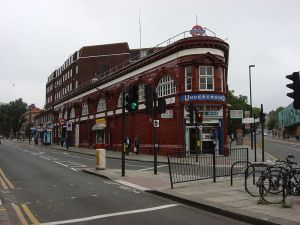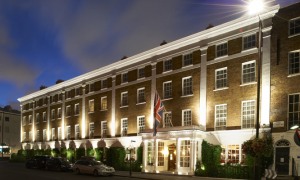“Dear Sir–I have just returned (without reading it) a letter of Ly. F(alkland) & a parcel containing I know not what–…she is certainly mad or worse–I think you must really take some step or she will commit herself in some greater absurdity–I heard from her once before but did not like to trouble you again and soon–but really this is too bad–Believe me”
— 1813 Letter from Lord Byron to William Corbett, kinsman of Christina, Lady Falkland
Lady Falkland’s husband had been one of Byron’s good friends. In 1808, Lord Falkland and one Mr. Powell had parted friends after a night of drunkenness. The next evening, Falkland hailed Powell with a good-natured sally: “What? Drunk again tonight, Poggy?”

Chalk Farm, London, the site of Lord Falkland’s duel, as it appears today. Photograph licensed under the Creative Commons Attribution-Share Alike 3.0 Unported license.
“Mr. Powell did not relish the mode in which he had been accosted and, after a retort, Lord Falkland snatched a cane from a gentleman’s hand, and used it about his head.” — The Lady’s Magazine: Or Entertaining Companion for the Fair Sex (1809)
The parties were unable to resolve their differences, with the result that Lord Falkland was fatally wounded in a duel with Powell. His widow, Christina, was left destitute.
Byron felt sorry for her and left a significant sum of cash for her to find in a teacup where she resided in Manchester Square’s “Durant’s Hotel.” He did so discreetly, to avoid drawing attention to her insolvent state. Thus he set in motion an infatuation fueled by her imagination, and his poetry.
It was not the money, mind you. It was the act itself–a furtive, secret offering, that no one was meant to see but her alone. That act was like a seed planted in her mind made fertile by the Thyrza stanzas in Byron’s wildly popular Childe Harold:
“Ours too the glance none saw beside / The smile none else might understand.”
Christina convinced herself of an intimacy with Byron that did not exist, yet seemed very real to her. The hero of the poetry was, like Byron, “world-weary and isolated” and she identified with him. Adding to that appeal was the notion he dared not publicly announce his love for her, nor would he dare ask she do the same.
She dashed off a letter to him:
“Tell me my Byron– if those mournful, tender effusions of your Heart & mind, to that Thyrza, who you lamented as no more– were not intended for myself […] now my Byron if you really believe I could add to or constitute your happiness, I will most joyfully receive your hand– but remember I must be loved exclusively.”
They say infatuation is a form of madness. Who knows if Christina had recovered from it by the time she died in Vauxhall in 1822.
But that was where they had moved Bedlam Hospital in 1815.


Wonderful post, but so sad. Humans never really change, do we?
LikeLike
That’s why we’re in the business we’re in.
LikeLike
Ironic turn of events…….who would have thought? Great post!
LikeLike
Thanks so much!
LikeLike
What a fabulous post!
LikeLike
How very interesting, Angelyn! Tweeted as well!
LikeLike